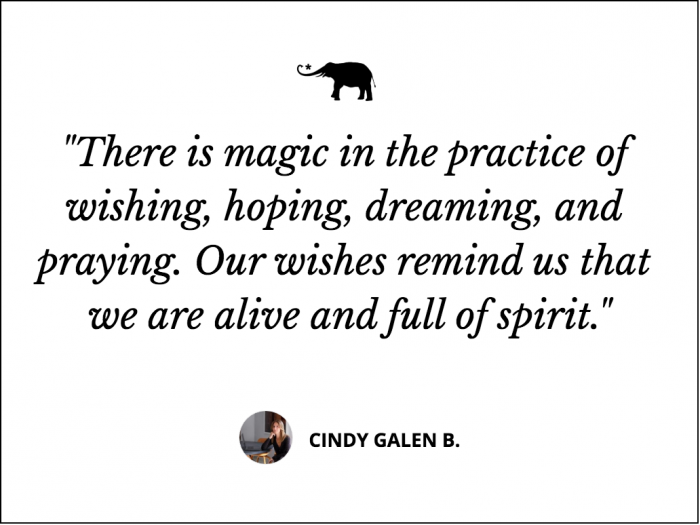View this post on Instagram
I could see the night sky in my mind’s eye.
It was a deep shade of purple with bright, sparkling stars. The song “Twinkle, Twinkle, Little Star” played inside my head.
I asked the young woman whose tarot cards I was reading if she had stopped making wishes. Her shoulders slumped downwards and her eyes peered toward the ground. She didn’t have to answer. I told her that I’d forgotten to make my wishes too. If we weren’t attending a quiet dinner party, we’d have talked all night about why we don’t wish for anything anymore. She was so young and beautiful, though. I wanted to grab her and tell her to wish for everything her heart desires.
For weeks afterward, “Twinkle, Twinkle” played over and over in my head. I remembered the starry evenings when my children were small and how we sang together before bedtime. We’d look up into the dark, shimmering sky, make our most heartfelt wishes, and look for shooting stars. I recalled myself as a little girl, wearing fuzzy pajamas, squinting and pointing out the window—enchanted by the stars.
I wondered what had happened to that wishful spirit that lived inside of me. And why I deemed for it to shine just one day a year—on my birthday.
Then I thought of the many wishes I’d made that never came to be. I must have given up on my wishes altogether along the way. I’d assumed becoming jaded was a natural part of growing up—that we grow out of fairy tales and nursery rhymes.
What I didn’t realize was that believing in the impossible and remaining hopeful can exist along with our longings and our desperation—that one doesn’t cancel the other out. I didn’t know that wishes are unencumbered.
And when I considered the cards the young woman had pulled from the deck, I learned it’s not our age or our maturity that has us forfeit our wildest dreams. It isn’t the lack of receiving what we have wished for either. Rather, it’s the thoughts and beliefs we come to associate ourselves with that dim our light and blind us from the miraculous nature of the universe. They tell us to shrink, play it small, and ignore our inner voices.
Here are five common rationalizations we identify with, which encourage us to surrender our desires:
1. Realism. Some like to call themselves realists. They believe making wishes is silly and impractical. They say life is random, a mix of good and bad. While this may be true, we can’t deny that there are many times when life feels more aligned than accidental. There are only so many coincidences we can write off as a fluke.
Being realistic is a justification we typically use to prevent ourselves from experiencing pain or defeat. In a sense, it holds us in a place of expecting the worst to happen. Yes, we may experience trauma and tragedy in our lifetime, but we may also experience endless wonder and joy too. If we are always prepared for the worst, then we aren’t fully open to every possibility. We may miss out on all the love and happiness that are there for us too.
2. Disillusion. Some say their wishes never come true and that casting them is a waste of time. When our wishes don’t actualize, it can be disappointing and frustrating. However, the end result isn’t the only reason why we wish upon a star. Our wishes are our inspiration—sparks of light. They help us to live with hope and curiosity.
When a future outcome becomes our sole purpose, then we have forgotten the present moment. We can live out our dreams and remain in the here and now. This allows us to be open and accept life’s natural unfolding.
3. Judgement. Many of us worry that we wish for too much. We believe to want more is to be greedy. We’ve learned we should appreciate what we have. Our wishes, however, don’t need to be subjected to criticism. We can wish to live in a big house on top of a hill or we can wish to end homelessness. Neither wish is better than the other. Our wishes aren’t graded, ranked, or rated.
We don’t need to judge our negative wishes either. We will often make these types of wishes while watching or playing sports: hoping a team will lose or a player strikes out. However, it’s important to note that those types of wishes don’t bring us the same enthusiasm or joy (resonance in the body) as those that originate from our hearts.
4. Perfectionism. Some of us would like our dreams to materialize exactly how we planned. We want things to be easy and go smoothly. Yet, we know life has a way of altering whatever we envision. We don’t need to give up on our creations when life gets in the way. “Man plans, God laughs.” We can learn to find the beauty in this too. We can become flexible and trust that what is meant for us will find us.
5. Feeling unworthy. Many of us have learned to stay beneath the radar. We believe having big dreams is only for the lucky. Still, we know deep down that everyone is entitled to dream and dream as large as they would like. We mustn’t fear our own light or its potential. Everyone was born with something special to share.
There is magic in the practice of wishing, hoping, dreaming, and praying. Our wishes remind us that we are alive and full of spirit. They help us to understand and know ourselves intimately—our passions. And they propel us on our path of learning, growing, and evolving.
“Twinkle twinkle little star
How I wonder what you are
Up above the world so high
Like a diamond in the sky”
~
AUTHOR: CINDY GALEN B.
IMAGE: KISSENILLUSTRATED/INSTAGRAM


Read 14 comments and reply